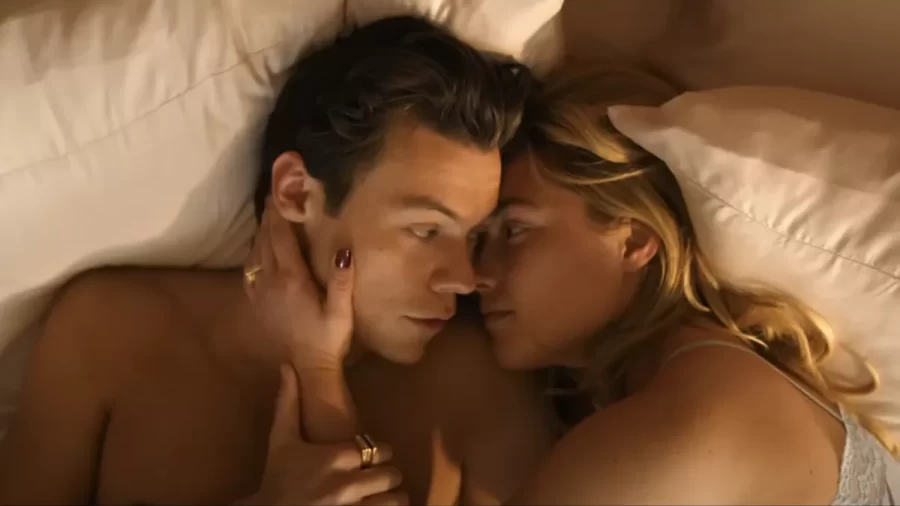Mediocrity strikes: I’m worried, darling
A “PERFECT” MOMENT: Main characters and lovers Jack (Harry Styles) and Alice (Florence Pugh) enjoy a seemingly ideal married life in the Victory Community.
November 2, 2022
After months of buzz about Harry Styles, Florence Pugh, and Chris Pine, director Olivia Wilde’s Don’t Worry Darling finally came out in theaters Friday, September 23. Although I kept up with the behind-the-scenes photos, press drama, and trailer releases, this film was still full of surprises. I had high hopes for Wilde’s second film, but wasn’t left with the resounding love I expected.
The movie surrounds a seemingly perfect neighborhood in the 1950’s called “Victory.” Every morning, the men drive to work at “The Victory Project” headquarters while the women stay home, relaxing and cooking. We meet Jack (Harry Styles) and Alice (Florence Pugh), a couple living in Victory, newly married and completely in love. We also meet Frank (Chris Pine), who is the cultist leader of Victory.
While Jack is at work, we see Alice’s daily life. From ballet class to lounging at the pool, the women in Victory live a life that anyone would dream of. Because the audience only views the movie from Alice’s perspective, we are unaware of what the men do at work. This directional choice was very effective as it kept the audience engaged and left us speculating The Victory Project’s purpose.
Alice takes note of strange happenings around her house. Although there are many weird instances, the scenes are pieced together fast. To the viewer, these occurrences begin to pass with no depth. Alice then begins to challenge Jack and Frank, Victory’s leader. Scenes where she discovers important information about Victory seem to drag on, creating an uneven pacing, with fast-paced quick scenes and longer scenes full of dialogue.
In the third act of the movie, the plot twist is revealed. The audience learns the real motivation of The Victory Project and the misogynistic structure of the town. This was a very entertaining and shocking watch, causing me to slowly raise my AMC lounge chair to, quite literally, sit on the edge of my seat. One of the main reasons this was so engaging and entertaining was the crowd of Style’s fans surrounding me. These scenes included a long hair and bearded version of Styles, evoking whoops and hollers from fans.
As mentioned before, the set-up of the beginning scenes suffered stylistically. Once the plot twist was revealed, it became evident that Wilde focused on the shock factor of the unexpected ending rather than the overall quality of the film. I enjoyed this ending based solely on the crowd reactions as well as watching it with many friends in the theater.
One of the aspects of this film that did not let me down was the acting. Obviously, Pugh hit it out of the park with her dramatic and hysterical performance. Many fans were anxious to see Style’s performance, including me. Although he did amazing, being cast as Pugh’s supporting actor can make any good actor look worse.
Overall, Don’t Worry Darling was a very entertaining watch. But, in the end, the film felt very basic. It brought nothing new or exciting to the film industry as other psychological thrillers have. Although it felt very standard, I recommend going to see it for the incredible acting performances by Styles and Pugh as well as the entertaining and exciting plot.


























